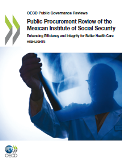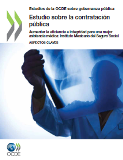Mexico
OECD Review of Public Procurement of the Mexican Institute of Social Security
11 January 2012
Mr. Angel Gurría, OECD Secretary-General, presented in Mexico City the findings of the OECD Review of Public Procurement of the Mexican Institute of Social Security. The findings of the review were discussed with the President of Mexico, Felipe Calderón, members of Congress, and principal representatives from the media and civil society.

Angel Gurría, OECD Secretary-General, in conversation with Daniel Karam,
Director General of the Mexican Institute of Social Security
|
|
 View the Report Highlights
View the Report Highlights
 |
 |
|
| English | Spanish |
Enhancing Efficiency and Integrity for Better Health Care
The Mexican Institute of Social Security (Instituto Mexicano del Seguro Social in Spanish, IMSS) is the largest health care and social security provider in Latin America, covering around half of Mexico’s population, and is a major spending entity within the Mexican government. In early 2011, IMSS asked the OECD to review the integrity and efficiency of its procurement system.
The review constitutes an in-depth analysis of IMSS’ procurement strategies and practices and benchmarks them with good practices of OECD countries around three main segments:
-
Framework and capability to deliver
-
Procurement process
-
Integrity and public accountability
Based on the findings of the review and its recommendations, the OECD and IMSS have set an Action Plan for reform of the IMSS procurement function that will transform procurement from an administrative task to a core strategic instrument. Major stakeholders are now on board to strengthen IMSS public procurement, enhance spending efficiency and deliver improved public services to meet citizens’ demands and expectation.
Good governance in public procurement provides savings and improves public service delivery
Efficiency and value for money are key principles which guide government action and are all the more important in times of fiscal consolidation. As an essential element of high-quality service delivery and a significant part of public budgets and gross domestic products, public procurement is an area in which governments must meet the challenge of doing more with less.
Procurement is also the government activity most vulnerable to waste, fraud and corruption. At the Cannes Summit in November 2011, G20 leaders recognised the importance of fair and transparent government procurement systems in their commitment to promote integrity, transparency and accountability.
Over many years, the OECD has acquired a wealth of experience in identifying good practice in public procurement, leading to the elaboration of the 2008 Anti-corruption and integrity in the public sector. The Principles, agreed by all Member countries, were developed to help policy-makers reform the whole procurement cycle, from needs assessment to contract management and payment.
This review is part of the series of OECD peer reviews that help countries assess their procurement systems in line with their commitment to implement the OECD Principles in major spending areas.
A second report by the OECD, "Fighting Bid Rigging in Public Procurement in Mexico" was also launched at the same occasion.
Further information
-
Secretary General Speech (Spanish)
-
Press Release (Spanish)
- Fighting Bid Rigging in Public Procurement in Mexico
For more information on our work on public sector integrity, visit:
www.oecd.org/gov/ethics
Follow us on :
Related Documents



